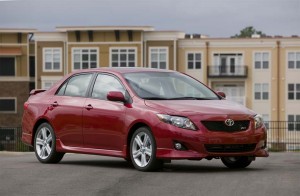The swirling safety scandal surrounding Toyota heated up still more, this morning, with the automaker announcing it will investigate whether to recall its popular Corolla model due to mounting complaints about steering problems; but the automaker’s President and CEO, Akio Toyoda has declined a request to appear before a U.S. congressional committee investigating the spate of problems facing the struggling automaker.
Complaints about the Corolla have surfaced, in recent weeks, along with allegations involving a number of other Toyota models. The humbled Japanese giant is already involved in the recall of more than 8 million vehicles to fix two separate issues that could lead them to surge out of control – something dubbed “unintended acceleration”; another 440,000 Prius hybrids, from the 2010 model-year, are being recalled due to braking problems and Toyota is looking into allegations of similar issues with older models; hundreds of thousands of Corollas and Matrix crossovers are under U.S. government scrutiny due to reports they can stall unexpectedly.
In all, government regulators have now been told of 37 deaths allegedly linked to Toyota safety issues, a number that could still grow, especially as plaintiff attorneys begin to prepare actions against the manufacturer and surreptitiously file NHTSA complaints, which will take months to verify, if they are ever verified. Toyota in 2008 became the world’s largest carmaker.
CEO Akio Toyoda, grandson of Toyota’s founder, was one of numerous company executives asked to testify before Congress during hearings later this month, but the executive demurred, stating, “”We are sending the best people to the hearing, and I hope to back up the efforts from headquarters,” during a news conference in Tokyo, on Wednesday morning.
It was Toyoda’s third meeting with reporters in just two weeks, after remaining nearly invisible in the prior months, as the safety scandal began to accelerate. Toyota initially announced the recall of 3.8 million cars, trucks and crossovers due to what it said was “carpet entrapment,” last October, Group Vice President Bob Carter telling reporters, at the time, that talk of further problems was “unwarranted speculation.” But in January, the maker announced a second recall, adding millions more vehicles it said might be vulnerable to sticking accelerators.
Charges continued to fly that the maker was either overlooking or covering up problems with electronic control systems. And that contention has embroiled vehicles involved in more than just the so-called unintended acceleration” issue.
One Corolla owner complained to the National Highway Traffic Safety Administration that whenever his cellphone would receive a text message, he would feel a slight lurch in its steering.
Toyoda, who was first spotted by reporters, three weeks ago, in Davos, Switzerland, where he issued a terse apology as he left an annual conference of millionaire world leaders, formally broke his silence a week later, issuing the first of a series of apologies for Toyota’s problems.
In his latest news conference, the executive insisted that American executives will “amply answer the questions” expected at a congressional hearing. Among those expected to appear is Yoshi Inaba, Toyota’s top executive in the U.S.
Meanwhile, the man in charge of global quality control, provided a disturbing update on Corolla, saying the company is taking seriously allegations of steering problems with the compact model, one of the best-selling vehicles in the world. If a problem is isolated, it could lead to yet another recall.
Industry observers warn that the maker is now in a delicate situation. Virtually every vehicle has logged some complaints with NHTSA, as well as regulatory bodies abroad. Toyota has been claiming that most of these are of such low volume they don’t indicate a defect actually exists. But simply tallying up complaints can be misleading, company executives now agree, because many customers may fail to report problems with the NHTSA.
But as Toyota’s problems have worsened, garnering the maker near-daily headlines, complaints have steadily increased. The number of owners of 2005 through 2009 Prius hybrids reporting braking problems grew nearly four-fold just between February 1 and 8, Carter told TheDetroitBureau.com, dubbing it “a head-scratcher.”
With federal regulators now questioning whether Toyota obeyed the laws covering the disclosure of defects and the subsequent recall response, the maker may feel pressed to act on potential issues it would have previously written off, said a senior executive at one of the maker’s competitors, asking not to be identified.
Whether the flood of headlines and recalls will damage Toyota’s image – and, in turn, its sales – is unclear. There are growing indications, from various sources, that the constant drumbeat of headlines are beginning to impact demand for the automaker’s products, though other reports suggest that loyalowners aren’t ready to abandon the brand.
The maker initially issued a “stop-sale” for vehicles involved in the accelerator recall, also idling five North American plants producing the eight impacted vehicles. But January data show sales of other models were largely unaffected by the ongoing news.
Now, that could be changing. On Tuesday, Toyota announced it would temporarily idle production at two U.S. plants due to rising inventory levels caused by slowing sales. That includes the Texas facility producing the maker’s biggest truck, the full-size Tundra.


You know there are RF packets that are sent when a cell phone recives emails or phone calls. The RF could have been near the steering wheel sensor (EPS). There are known problems with RF and the Corolla’s 2009 and 2010.